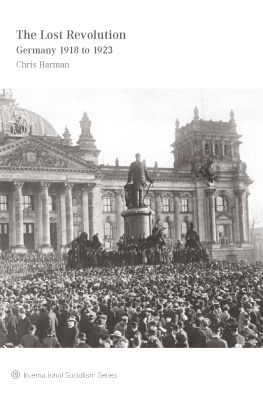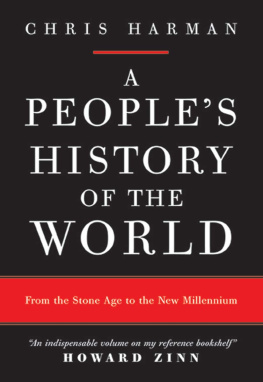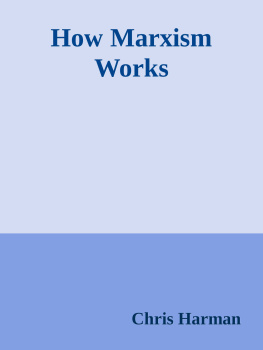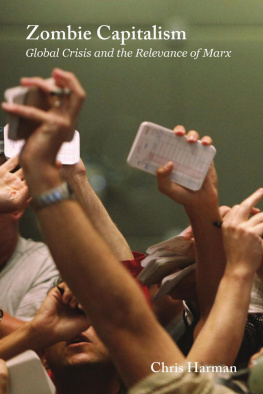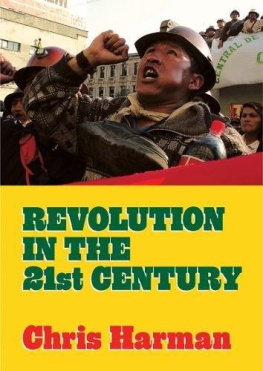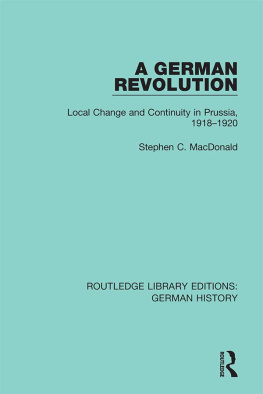Chris Harman - The Lost Revolution Germany 1918 to 1923
Here you can read online Chris Harman - The Lost Revolution Germany 1918 to 1923 full text of the book (entire story) in english for free. Download pdf and epub, get meaning, cover and reviews about this ebook. year: 2017, publisher: Perseus Books, LLC, genre: Politics. Description of the work, (preface) as well as reviews are available. Best literature library LitArk.com created for fans of good reading and offers a wide selection of genres:
Romance novel
Science fiction
Adventure
Detective
Science
History
Home and family
Prose
Art
Politics
Computer
Non-fiction
Religion
Business
Children
Humor
Choose a favorite category and find really read worthwhile books. Enjoy immersion in the world of imagination, feel the emotions of the characters or learn something new for yourself, make an fascinating discovery.
- Book:The Lost Revolution Germany 1918 to 1923
- Author:
- Publisher:Perseus Books, LLC
- Genre:
- Year:2017
- Rating:3 / 5
- Favourites:Add to favourites
- Your mark:
- 60
- 1
- 2
- 3
- 4
- 5
The Lost Revolution Germany 1918 to 1923: summary, description and annotation
We offer to read an annotation, description, summary or preface (depends on what the author of the book "The Lost Revolution Germany 1918 to 1923" wrote himself). If you haven't found the necessary information about the book — write in the comments, we will try to find it.
The Lost Revolution Germany 1918 to 1923 — read online for free the complete book (whole text) full work
Below is the text of the book, divided by pages. System saving the place of the last page read, allows you to conveniently read the book "The Lost Revolution Germany 1918 to 1923" online for free, without having to search again every time where you left off. Put a bookmark, and you can go to the page where you finished reading at any time.
Font size:
Interval:
Bookmark:
The International Socialism book series (IS Books) aims to make available books that explain the theory and historical practice of working class self-emancipation from below. In so doing, we hope to rescue the main tenets of the revolutionary socialist tradition from its detractors on both the right and left. This is an urgent challenge for the left today, as we seek to rebuild this tradition in circumstances that often downplay the importance of organized revolutionaries.
By reissuing classics of the international socialist tradition, we hope to offer accessible and unique resources for todays generation of socialists.
Other titles in the International Socialism series:
Leon Trotsky and the Organizational Principles of the Revolutionary Party
Dianne Feeley , Paul Le Blanc , and Thomas Twiss ,
introduction by George Breitman
Mandate of Heaven: Marx and Mao in Modern China
Nigel Harris
The Duncan Hallas Reader (forthcoming)
Edited by Ahmed Shawki
The Lost Revolution: Germany 1918 to 1923
Chris Harman
Marxism and the Party
John Molyneux
Party and Class
Tony Cliff , Duncan Hallas , Chris Harman, and Leon Trotsky
Russia: From Workers State to State Capitalism
Anthony Arnove , Tony Cliff , Chris Harman , and Ahmed Shawki
Introduction
The Kaiser Alexander Regiment had gone over to the revolution; the soldiers had rushed out of the barracks gates, fraternised with the shouting crowd outside; men shook their hands with emotion, women and girls stuck flowers in their uniforms and embraced them. The officers were being stripped of their cockades and gold lace... Endless processions of workers and soldiers were passing without break along the road... Army lorries passed by with red flags; they bore soldiers and red-ribboned workers, crouching, kneeling or standing alongside the machine guns, all in some fighting attitude, all ready to fire... All the men around the machine guns on the lorries or resting their rifles on their knees in commandeered private cars were manifestly filled with iron revolutionary determination.
The Hotel Escherhaus is now the headquarters of the Red Army. The hotel rooms are stuffed full of red troops... Outside there is constant movement in this disorderly collection of armed men. Sailors, civilians with hardly any sign of the military on them, armed men in uniforms or in civilianised military clothing, with caps, hats or bare heads, with rifles, guns, hand grenadeseverything moves around like an ant-heap. Cars constantly arrive with new loads of armed men, while from the other side red soldiers march in, singing... From the front come wounded and exhausted Red Guards.
No elegant gentleman or well-to-do lady dared show themselves in the streets. It was as if the bourgeoisie had vanished from the surface of the globe. Only workerswage slaveswere to be seen. But they were seen with arms... It was an unprecedented sight: a throng of armed proletarians in uniform or working clothes, moving in endless columns. There must have been 12,000 to 15,000 armed men... The meeting outside the palace presented a picture familiar from May Day demonstrationsyet how different the spirit...
Revolutions that are defeated are soon forgotten. They become lost from view; footnotes to history, glossed over by all but a few specialist historians. The eyewitness accounts above, of events in three different German cities, bear testimony to a great revolutionary upheaval. And, despite similarities with what was happening at the same time in Russia, thousands of kilometres to the east, they show an upheaval in the heart of an advanced industrial society, in Western Europe. Sufficient to prompt the British prime minister Lloyd George to write to the French premier Clemenceau: The whole existing order, in its political, social and economic aspects, is questioned by the masses from one end of Europe to the other.
Without an understanding of the defeat of the revolutionary movements of Germany after the First World War, the Nazism that followed cannot be understood. The great barbarism that swept Europe in the 1930s arose out of the debris of defeated revolution. The road which led to Buchenwald and Auschwitz began with little known battles in Berlin and Bremen, Saxony and the Ruhr, Bavaria and Thuringia in 1919 and 1920. The swastika first entered modern history as the emblem worn in these battles by the counter-revolutionary troops.
Not only in Germany did the lost revolution leave its imprint. Germany was the worlds second industrial power at the close of the First World War. What happened there was bound to affect decisively the whole of Europe, and in particular what happened to the revolutionary state just created in Russia, within easy marching distance of Germanys eastern boundaries.
The leaders of revolutionary Russia knew only too well that in the miserably backward conditions of Russia it was not possible to create the kingdom of plenty that Marxists had always seen as the material precondition for the ending of class society. They looked to international revolution to relieve Russias backwardness.
When news reached Russia in early November 1918 of the fall of the German monarchy, one witness, Karl Radek, tells how:
Tens of thousands of workers burst into wild cheering. Never have I seen any like it again. Until late in the evening workers and Red Army soldiers were filing past. The world revolution had come. The mass of people heard its iron tramp. Our isolation was over.
The expectations of world revolution were to prove wrong. The years 1918 to 1924 saw empires fallin Germany and Austria-Hungary as well as Russia. They saw workers councils rule in Berlin and Vienna and Budapest as well as in Moscow and Petrograd. They saw some of the biggest strikes in British history, guerrilla war and civil war in Ireland, the first great national liberation movements in India and China, the occupation of the factories in Italy, bitter, bloody industrial struggles in Barcelona. But it was a period which ended with capitalist rule intact everywhere except Russia.
A central argument of this book will be that this was not inevitable. But it happened. And having happened, it undercut all the premises on which the Russian Revolution was based.
Without the revolution in Germany, we are doomed, Lenin declared in January 1918. Doom struck in a way that Lenin had not expected. He had thought that an isolated Soviet Russia would eventually collapse under the sheer pressure of hostile forces from outside. These it survivedbut only at enormous cost, as isolation produced economic devastation and economic devastation led to the closure of all the great factories, bringing appalling hardship and starvation to cities and villages alike. Above all it led to the disintegration of the industrial working class that had made the revolution in 1917. The Bolsheviks who had led the workers in 1917 were forced to change from being the representatives of the working class to being a sort of Jacobin dictatorship acting in their place. And in a backward country pushed still further backward by long years of world war and long years of civil war, a new bureaucratic dictatorship could all too easily crystallise out of that revolutionary dictatorship.
Isolation begat devastation and devastation begat bureaucracy, bringing a new form of class rule. To tell that story would take us right away from the theme of this book. But the crucial point is that the starting point for the process of degeneration of the Russian Revolution lay outside Russia. Stalinism, as much as Nazism, was a product of the lost German Revolution.
There is another reason for looking at the defeat of the revolutionary movement in Germany. Since 1968 the world has entered a new period of revolutionary explosions: France in 1968, Chile in 1972-73, Portugal in 1974-75, Iran, Nicaragua and El Salvador in 1979-80. In each of these the force which was central to the events in Germany in 1918-23, the industrial working class, played a key role.
Next pageFont size:
Interval:
Bookmark:
Similar books «The Lost Revolution Germany 1918 to 1923»
Look at similar books to The Lost Revolution Germany 1918 to 1923. We have selected literature similar in name and meaning in the hope of providing readers with more options to find new, interesting, not yet read works.
Discussion, reviews of the book The Lost Revolution Germany 1918 to 1923 and just readers' own opinions. Leave your comments, write what you think about the work, its meaning or the main characters. Specify what exactly you liked and what you didn't like, and why you think so.

